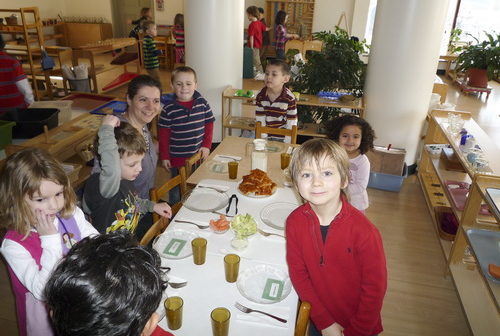Beginning this week, and continuing throughout this fall and winter, the International Montessori Teaching Institute (IMTI) is running a series of hands-on workshops to teach Montessori methods to non-Montessori teachers and parents across a broad range of topics.
What is the Montessori Method?
The Montessori Method is an educational system based on the theories of Maria Montessori. Maria Montessori was an Italian physician and educator who began developing her pedagogy or theory of learning in the late 19th century. She based her philosophies directly on her observations of children in the classroom. Today there are in excess of 20,000 Montessori schools around the world. There are many schools here in Beijing which tout themselves as Montessori, a subject touched on in this recent article. (An upcoming blog post will look helping parents to assess whether a school is really Montessori or not.)
The Montessori Method aims to encourage students’ creativity and independence by promoting autonomy and freedom. It’s a practical hands-on system of education, and students use Montessori equipment and materials to learn through interactive tactile discovery rather than instruction. Children also often have more choice over what activities or materials they want to work with and when. The Montessori Method emphasizes reaching children along multiple concrete paths, and using their five senses.
What is the Montessori Theory of Intelligence?
Montessori’s earliest educational experiences were with disadvantaged and disabled children. As a result of her experiences she came to believe in a broader scope of human capacities and intelligences. She wrote that “little children soon reveal profound individual differences which call for very different kinds of help from the teacher”.
Many of the Montessori exercises call upon different intelligences in the pursuit of teaching and learning a new idea.
This article gives the following example:
… a Montessori mathematics lesson on the geometric solids uses bodily-kinesthetic intelligence in feeling the forms, visual/spatial in observing and internalizing images of the forms, logical-mathematical intelligence in establishing relations between them, naturalistic intelligence in observing and classifying them, and linguistic in labeling them. If the child did this activity with other children, he or she could also exchange ideas about the forms and share them, thus utilizing interpersonal intelligence.
What Workshops Are Available this Month?
Art: August 21, 9am-5pm, RMB 400 (lunch included)
The first workshop is on
art and will be taught by Bing Bing Liu, who is the Art Teacher at Jiade Montessori Bilingual Kindergarten.Bing Bing will teach a practical session on how to make painted bottles, and clay figures, as well as demonstrating kite painting and creative pasting. Be prepared to get your hands dirty!
Music & Movement: August 22, 9am-5pm, RMB 400 (lunch included)
This workshop will look at actively engaging with music to keep kids tuned in and enthusiastic. The workshop will be lead by Brittany Dunn who is the Drama Teacher Jiade Montessori Bilingual Kindergarten. Again with the focus firmly on participation and actively learning the skills and techniques, come prepared to strut your stuff and move!
What Are Some Upcoming Workshops?
- Infants and Toddlers (0-3years): October (Date to be finalized, check on www.imti-china.com for further information.)
- Chinese Culture: November 9
- Designing Classroom Materials: January 25
How Can I Participate?
If you are interested in attending any of the upcoming workshops, contact Snow Zhang at 8949 6877 ext 288 or
snowzhang@imti-china.comThe Different Strokes series of blog posts examines current intelligence theories. Future installments will look at how these theories can be used by parents to maximize their children’s learning.
Click here for the first post in the series.
Photo courtesy of Flickr.com




